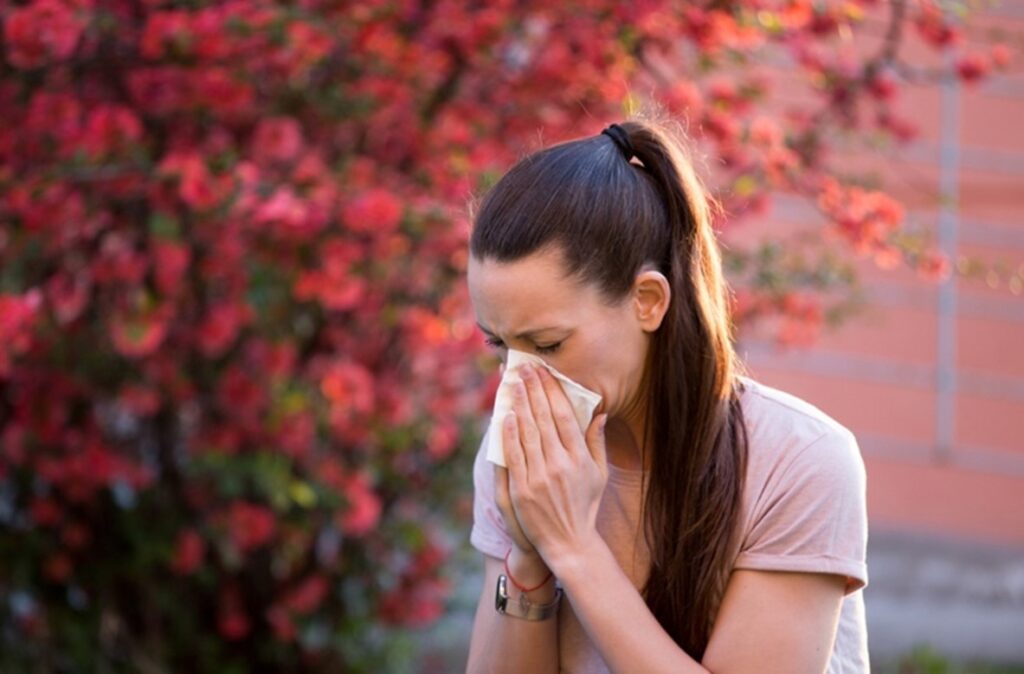Someone grab the tissues! Seasonal allergies are in full swing throughout the country, and many people feel their wrath as they celebrate all things fall.
Affecting nearly 30% of adults and 40% of children each year, they’re a prevalent cause of minor yet irritating cold and flu-like symptoms.
Since the COVID-19 pandemic began, many people have found it hard to differentiate the root cause of their symptoms because many who experience COVID-19 have symptoms that can mirror a common cold.
Although almost 60% of the population has already been infected with COVID-19, it can still be tough to nail down the exact cause of their nasal congestion, cough, sore throat, or headache — all common symptoms of both a cold and the coronavirus.
We are here to help you understand the differences in allergies vs. COVID-19 so that you are well informed about their root cause, symptoms, and treatment options, just in case you start experiencing similar symptoms.
Let’s start by defining allergies vs. COVID-19 so you better understand how you get them and how they can affect your body throughout your exposure.
What Is COVID-19?
COVID-19 is an infectious respiratory disease. It is part of the coronavirus family and caused by the SARS-CoV-2 virus.
For most, COVID-19 causes mild to moderate respiratory symptoms.
In rare instances, severe symptoms may be experienced. These symptoms can lead to death for a small minority of people, especially for immunocompromised patients.
Some people with COVID-19 are symptom-free.
It is important to note that anyone can contract the COVID-19 virus at any age, even if you’ve already had it or have been vaccinated against it.
COVID-19 spreads from person to person through small, liquid particles produced by the mouth or nose of an infected individual when they cough, sneeze, speak, sing, or breathe.
What Are Allergies?
Allergies are best described as the immune system’s overreaction to a specific allergen exposure. Allergies can be both seasonal and year-round.
Seasonal allergies are caused by allergens found in the air. The most common include pollen and ragweed.
It is important to note that one or more allergens can trigger seasonal allergies, so a person is capable of being allergic to more than one natural element. Many people are allergic to both pollen and ragweed.
Year-round allergies bring about the same immune system response but are triggered by other environmental or lifestyle factors, such as exposure to pet dander or black mold.
If you or a loved one regularly experience allergies, it is best to opt for a full allergy test to determine precisely what is causing your symptoms so that you may avoid the allergen altogether.
Allergies vs. COVID-19 Symptoms
As mentioned, some symptoms of allergies and COVID-19 are similar in nature, but there are some significant differences between these two types of respiratory-focused conditions.
Read the list below to see the differences in symptom type and frequency when comparing allergies vs. COVID-19.
| Symptoms | COVID-19 | Allergies |
| Chills | Usually | Never |
| Fever | Usually | Never |
| Itchy/Scratchy Throat | No | Yes |
| Body Aches | Usually | Rarely |
| Shortness of Breath | Yes | Sometimes |
| Sore Throat | Sometimes | Sometimes |
| Nausea / Vomiting / Diarrhea | Sometimes | Never |
| Loss of Smell | Usually | Rarely |
| Wheezing | Sometimes | Sometimes |
| Headache | Sometimes | Sometimes |
| Nasal Congestion | Sometimes | Usually |
| Runny Nose | Rarely | Usually |
| Sneezing | Sometimes | Usually |
| Itchy/Watery Eyes | Never | Usually |
| Dry Cough | Usually | Sometimes |
You are most likely experiencing an allergic reaction if
- Your eyes are itchy and watery.
- Your symptom severity increases in specific environments or during certain parts of the year, especially spring and fall.
- Your symptoms are long-winded but remain at the same severity level.
- Symptom severity and frequency improve when you remove a specific allergen from your life.
You may have COVID-19 if
- You have a fever.
- You’ve lost your sense of taste or smell.
- You are experiencing severe body aches and fatigue that last several days.
- You have a persistent cough.
Allergies vs. COVID: Treatment Options
Allergies and COVID-19 are treated in pretty different ways.
Most people who test positive for the coronavirus recover on their own without the need for medical intervention.
The best way to nurse COVID-19 is to treat the symptoms directly with the following:
- Proper hydration
- Adequate rest
- Fever reducers
- OTC anti-inflammatories, pain relievers, and decongestants
- Throat lozenges
- OTC saline nasal drops or spray
- A cool-mist vaporizer or humidifier
In more severe cases, a visit to urgent care or the emergency room is necessary, especially for those who experience high fevers, respiratory issues, or complications associated with COVID-19.
If you or a loved one is currently living with severe and debilitating COVID-19 symptoms, visit your nearest urgent care or emergency room now. For immediate care, dial 9-1-1. Don’t delay medical intervention — your life depends on it.
As with COVID-19, treating the symptoms is the best way to reduce allergy severity.
Some of the best options for allergy treatment include
- OTC antihistamines, decongestants, and nasal sprays
- Avoiding the triggering allergen
- Wearing a mask when outside or exposed to the allergen
- Modifying indoor spaces to keep allergens out
- Washing your hair and face after exposure
Allergy and COVID-19 Care in Houma
If you are experiencing symptoms consistent with seasonal allergies or are unsure what is causing your respiratory issues, we can help.
Visit our urgent care facility in Houma today to get your allergy symptoms examined or get tested for COVID-19. You shouldn’t have to live with unrelenting symptoms.
We are open daily with no appointments necessary; simply walk in for care and start feeling better today.




